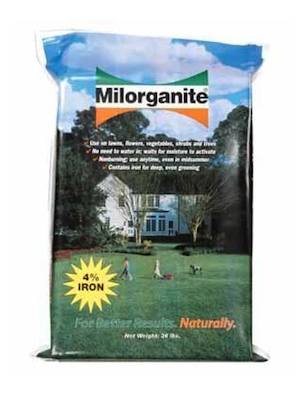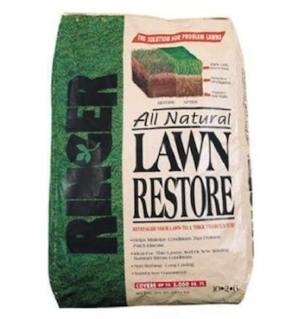Organic Lawn Fertilizer
A healthy green lawn provides a lot of benefits in addition to creating a beautiful setting for your home: lawns absorb water, which helps reduce stormwater runoff and controls erosion; the grass plants absorb carbon dioxide and provide oxygen; a grass lawn can offer a significant local cooling effect. The list goes on and on.
But keeping a lawn green can come at a heavy cost to the environment. Modern chemical fertilizers have a very heavy environmental footprint, can be harmful to children and pets, and in the long run can actually damage and degrade a lawn's soil. For your green lawn, consider a natural, organic fertilizer.
Synthetic Lawn Fertilizer: Junk Food for Your Lawn
All plants need nutrients to live and grow; the grass in your lawn is no exception. Moreover, grass plants lose nutrients more quickly due to heavy lawn traffic and mower damage. Therefore, regular feeding is critical to maintain a healthy lawn. Using a conventional, commercial lawn fertilizer will work very well to produce quick, short term growth and a burst of green; there's no denying that. However, the use of these chemical fertilizers may be putting your lawn's long-term health at risk. How?
The health of any plant, whether it's your lawn's grass or the vegetables growing in the garden, is directly related to the health of the soil they're growing in. In a lawn, grass gets most of its nutrients from microbes in the soil that feed on organic matter. When a synthetic fertilizer is applied, the microbes get a chemical Big Gulp of nutrients which creates a microbe population explosion, which quickly consumes all of the organic matter stored in the soil.
Hence, a quick burst of green growth. As the organic matter is depleted, the microbes vanish, slowing growth of the grass and creating a damaged, compacted soil. The only solution: applying more chemical fertilizer to make up for the damaged soil. And on and on. This is an extremely unhealthy balance.
More Bad News About Chemical Fertilizers
In addition to creating an unhealthy soil environment for grasses, continual use of chemical fertilizers can contribute to water pollution. As more and more fertilizer is added to the lawn to keep it green, and the depleted soil becomes more compacted, a large amount of these water soluble fertilizers leech away into the groundwater, or simply run off the lawn during rains, finding their way into waterways and drinking water supplies.
Chemical fertilizers, by their very nature, are made from toxic ingredients that can be harmful to children, pets, or anybody else who comes into contact with them on the lawn.
Synthetic nitrogen fertilizers are manufactured using natural gas, which is a non-renewable fossil fuel. The energy consumed to make chemical fertilizers for U.S. farmers for just one year could heat 5.5 million American homes for that same year. Using polluting non-renewable fossil fuels for creating a toxic product that damages the soil just doesn't seem like a very smart thing to do.
Organic Lawn Fertilizer: Health Food For Your Lawn
The alternative to poisoning your lawn's soil with chemical fertilizers is the natural, organic approach. Today, there are more and more natural fertilizer options available, as more people seek out healthier, natural options for their lawn care. Your lawn, your family, and the planet will benefit from switching to a more natural fertilizer.
Let's consider some of those benefits:
- A natural lawn fertilizer releases its nutrients slowly, nourishing the soil's microbes. The soil's health improves, the grass' roots grow deeper, the lawn becomes healthier.
- A healthier soil will require much less water since it will be able to retain much more moisture. As the grass' roots grow deeper into the microbe-filled soil, it will require less water. Conserving water should be near the top of any green homeowner's 'To Do' list.
- Natural fertilizers are completely safe for humans or pets to be around (though they should obviously NEVER eat it).
- A slow release, natural fertilizer won't burn your lawn as some chemical fertilizers can when they release their nutrients too quickly.
- Since a natural lawn fertilizer works to restore the natural balance of your lawn's soil, it will also help prevent such lawn issues as moss and mushrooms, and other lawn diseases.
Natural fertilizers can be made from a number of natural materials. The most common are manures from poultry, seaweeds, fish extracts, agricultural byproducts, even the processed byproducts of wastewater treatment systems (like Milorganite). Some of us here at Green Home Source have been known to fertilize with the ground-up remains of turkeys from a local turkey farm, affectionately referred to as 'turkey dirt.' These are all non-toxic, renewable sources of natural nitrogen fertilizer.
The bottom line is: natural fertilizer works. You may not get the instant explosion of green that a commercial synthetic fertilizer provides, but you will get a healthy, green lawn. And more importantly, you will get a healthy, sustainable, living soil that helps complete the natural life cycle: Soil to Plant to Food to Waste, and back to Soil. That's the way nature intended for things to work, and that's the way to achieve a natural balance for your lawn without doing harm, and without toxic, nonrenewable, manmade chemicals.
comments powered by Disqus




































































